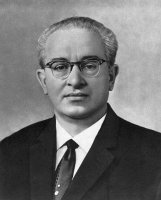Yuri Andropov and the Kremlin's Aggressive Foreign Policy
In the late 1960s, there appears to have been a power struggle within the Kremlin, between those who subscribed to a more conciliatory approach with the West, and those who subscribed to the view that the USSR had to become more confrontational to achieve its aims in foreign policy. It seems that this power struggle began in earnest in 1967.
Journalist Aaron R. Einfrank (then of the Toronto, Canada Telegram) recounted his observations of this Kremlin struggle in his reminiscences of his experiences reporting news from Moscow.[26] In particular, he points to the first public indications of turmoil coming to the attention of Western journalists in Moscow in June.
"Unfortunately the honeymoon began to end in mid-June [1967]. There were diplomatic reports of a Kremlin power struggle, in part confirmed by Shelepin's removal from the party secretariat and Kosygin's panicky departure for Glassboro (where he could offer President Johnson nothing because the disunity in the Politburo gave him no leeway for negotiation) [the Glassboro summit concerned an effort to limit anti-ballistic missile systems]. A planted story also can have domestic implications for the USSR., as was the case in the winter of 1968-69 when the Victor Louis-Novosti [press agency] complex was spreading the rumor that Kosygin was out. This was part of an effort of hardliners to oust Kosygin by laying the psychological groundwork for it."[26]
Einfrank's mention of Victor Louis is fortuitious. In an upcoming section, a more in-depth examination of Louis and his direct role in the dissemination of information on Soviet space events will be highlighted. But the indicators pointed out by Einfrank show how well-connected Victor Louis was to the thought-, as well as decision-making-processes--of the Central Committee/Politburo. (As it would prove out, both Shelepin and Kosygin survived the squabbles, and were members of the Central Committee well into the 1970s.)
 Coincidentally, Yuri Andropov was made head of the KGB in
1967, and became a Politburo member at the same time. According to Cambridge
historian Christopher Andrew, "Almost from the moment he became a candidate
(non-voting) member of the Politburo in 1967, Andropov established himself as a
powerful voice in Soviet foreign policy."[27] Furthermore, Andropov
additionally revealed his attitude as to how Soviet foreign policy should be
applied at the time of his political ascension:
Coincidentally, Yuri Andropov was made head of the KGB in
1967, and became a Politburo member at the same time. According to Cambridge
historian Christopher Andrew, "Almost from the moment he became a candidate
(non-voting) member of the Politburo in 1967, Andropov established himself as a
powerful voice in Soviet foreign policy."[27] Furthermore, Andropov
additionally revealed his attitude as to how Soviet foreign policy should be
applied at the time of his political ascension:
"On becoming chairman of the KGB in 1967, Andropov immediately announced his intention to revive KGB 'special actions' as an essential tool of Soviet policy during the Cold War. The FCD [Foreign Intelligence Directorate of the KGB], he declared, 'must take the offensive in order to paralyze the actions of our enemies and to get them involved in a struggle in conditions which are unfavorable to them.'")[28]
As a result of Andropov's ascendancy, and his avowed goal of "taking the fight to the enemy," are there examples of Soviet geopolitical forwardness subsequent to Andropov coming into the Kremlin hierarchy? There are indeed examples in the non-space activities sphere.
For example, there have been new insights proffered in a recently-published volume entitled Red Star Rogue about apparent activities resulting from decisions of the Central Committee. Based on new US intelligence-based information and interviews, the authors tell of a previously secret incident where the USSR attempted to fire a submarine-launched missile in April 1968 to start a war between the USA and mainland China.[29]
The book describes that a vocal minority in the Central Committee/Politburo--including apparently Aleksandr Shelepin, Mikhail Suslov and Yuri Andropov--wanted a more aggressive, confrontational approach with the West. This resulted in an apparently unauthorized (and ultimately, failed) attempt in using the submarine to engage in a nuclear attack on Hawaii. An attempt that, according to authors Sewell and Richmond, was allegedly not under the control of the General Secretary: "Brezhnev was.embroiled in an internal fight for control within the Kremlin."[30]
This aggressiveness, if correctly interpreted in the reportage found in Red Star Rogue, may have also been part of an on-going trend in other decisions as well (such as the invasion of Czechoslovakia in late August 1968). This aggressiveness may also help to explain the impetus behind a number of incidences relating to space-mission planning for December 1968 and July 1969 that may have--at their source--a movement within the Politburo to more aggressively challenge the USA in Super Power-connected competitions, such as the Moon race, with Andropov a main proponent.[27]
Some space historians, previous to this new information of a planned attack on Hawaii becoming known, might have thought that manned lunar space shots to preempt the Americans (with what might appear at first glance to have inadequate testing or preparation) would have been ludicrous. But the question front and center has to be asked in light of these new revelations, is it so fantastical?
One further little-examined aspect (prior to this publication appearance) regarding the Politburo's decision-making processes is how it disseminated to the media (especially the Western media) its decisions to approve specific manned space missions. Fortunately, this aspect can now be revealed with a great amount of detail.
|
NEWSLETTER
|
| Join the GlobalSecurity.org mailing list |
|
|
|

